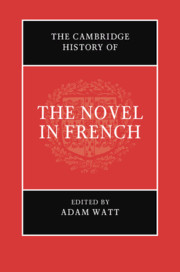Book contents
- The Cambridge History of the Novel in French
- The Cambridge History of the Novel in French
- Copyright page
- Contents
- Figures
- Contributors
- Acknowledgements
- Note on Conventions
- Chronology
- Introduction
- Part I Beginnings: From the Late Medieval to Madame de Lafayette
- Part II The Eighteenth Century: Learning, Letters, Libertinage
- Part III After the Revolution: The Novel in the Long Nineteenth Century
- Part IV From Naturalism to the Nouveau Roman
- 22 The Republic of Novels: Politics and Late Nineteenth-Century French Fiction
- 23 Medicine, Sex and the Novel: Maupassant and Rachilde
- 24 The Roman-Fleuve
- 25 Marcel Proust’s À la recherche du temps perdu
- 26 The Novel in France Between the Wars
- 27 Existentialism and the Novel
- 28 Suspicion and Novelty: The Nouveau Roman
- 29 The Holocaust and the Novel in French
- Part V Fictions of the Fifth Republic: From de Gaulle to the Internet Age
- Index
- References
22 - The Republic of Novels: Politics and Late Nineteenth-Century French Fiction
from Part IV - From Naturalism to the Nouveau Roman
Published online by Cambridge University Press: 04 February 2021
- The Cambridge History of the Novel in French
- The Cambridge History of the Novel in French
- Copyright page
- Contents
- Figures
- Contributors
- Acknowledgements
- Note on Conventions
- Chronology
- Introduction
- Part I Beginnings: From the Late Medieval to Madame de Lafayette
- Part II The Eighteenth Century: Learning, Letters, Libertinage
- Part III After the Revolution: The Novel in the Long Nineteenth Century
- Part IV From Naturalism to the Nouveau Roman
- 22 The Republic of Novels: Politics and Late Nineteenth-Century French Fiction
- 23 Medicine, Sex and the Novel: Maupassant and Rachilde
- 24 The Roman-Fleuve
- 25 Marcel Proust’s À la recherche du temps perdu
- 26 The Novel in France Between the Wars
- 27 Existentialism and the Novel
- 28 Suspicion and Novelty: The Nouveau Roman
- 29 The Holocaust and the Novel in French
- Part V Fictions of the Fifth Republic: From de Gaulle to the Internet Age
- Index
- References
Summary
This chapter explores the close, if often vexed, relationship between the novel and the Republic towards the end of the nineteenth century. It examines how the dominant aesthetic of prose fiction in this period, naturalism, framed itself as an ally of democracy – most directly with its expansion of the novel’s horizons to include, and do justice to, the experience, idiom, and political claims of the working classes. The political use of the naturalist novel as a critical document of social life resided, as Émile Zola saw it, precisely in its declared objectivity. But the form of naturalist fiction produced more contradictions than its theory allowed. This chapter returns the evolution of the naturalist novel to its political context, while tracking the rise of its rival forms (Symbolist and Decadent literature; the psychological novel), which often repudiated those central tenets of the Republic: positivism, scientism, democracy, anti-clericalism. Maurice Barrès and Paul Bourget scrutinised the academic and intellectual principles of a generation schooled by the Third Republic, in ways which offered an alternative pedagogy. By the time of the Dreyfus Affair, the novel had become a prime vehicle for conflicting ideological visions of a nation that was increasingly divided against itself.
Keywords
- Type
- Chapter
- Information
- The Cambridge History of the Novel in French , pp. 403 - 420Publisher: Cambridge University PressPrint publication year: 2021

